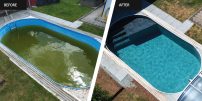It’s been nearly two months since the industry’s largest-ever product recall, and enforcement remains uncertain.
Pool and spa service contractors, in many cases, are being asked to identify and replace hundreds of thousands of drain covers that were deemed potentially hazardous by the U.S. Consumer Product Safety Commission in late May.
But local and state health departments, which typically ensure compliance for the nation’s public pools and spas, are finding they have little authority to carry out the CPSC’s recommendation that facilities be closed until recalled covers are replaced.
“We can let a facility know it had a recalled cover, but we can’t close that body of water,” said Valerie Hirata, environmental health specialist at the Southern Nevada Health District in Las Vegas.
Hirata explained that Nevada has regulations in place that call for anti-vortex covers on public pool and spa drains. But it has not adopted additional rules that mirror the federal Virginia Graeme Baker Pool and Spa Safety Act, and that’s where the discrepancy lies.
“We can only enforce the regulations we have — we’re bound by state law,” she said. “If I were to force someone to comply with the recall, for instance, they could simply pull me into court and point to the law I’m supposed to enforce. So, really, the onus is on the owner to close the pool if it doesn’t meet VGB.”
For its part, the CPSC’s 100 or so field staff, as well as local and state health agencies they’ve contracted, are actively checking public vessels for VGB compliance and now replacement covers, public affairs specialist Kathleen Reilly said.
But these aren’t dedicated inspectors; they’re also charged with verifying the safety of a number of other consumer products, from baby cribs to bicycle helmets. And much like VGB enforcement, there’s no mandate if states don’t have identical laws.
In Ohio, state health officials have posted information on the recall to the agency’s Website, and subsequently notified its approximately 125 local health departments. It is now up to those offices to determine how to proceed from there, said Jennifer House, public information officer at the Ohio Department of Health.
“They would be considered critical violations,” House added of pools or spas that contain the recalled covers. “But we haven’t issued further guidance or a length of time in which to address the situation.”
At least one local public health department there has taken an educational approach. Inspectors in Montgomery County, which includes the city of Dayton, are notifying public pool and spa operators of the recall and advising them to check for flagged covers.
Beyond that, there’s been no talk of closing any of the 365 pools, spas and sprayparks monitored by the department, said Jennifer Wentzel, sanitarian supervisor.
Meanwhile, environmental health officials in Riverside County (Calif.) know that many of the 7,400 public pools and spas they oversee were fitted with the incorrectly rated covers. But as of earlier this month, they weren’t yet able to notify individual facility operators who may have installed those covers.
“We’re not planning to try to tackle that at this time,” said Keith Jones, the department’s deputy director. “Currently, we’re in the process of determining which facilities have the recalled drain covers. At this point it’s more a matter of getting the word out.”




